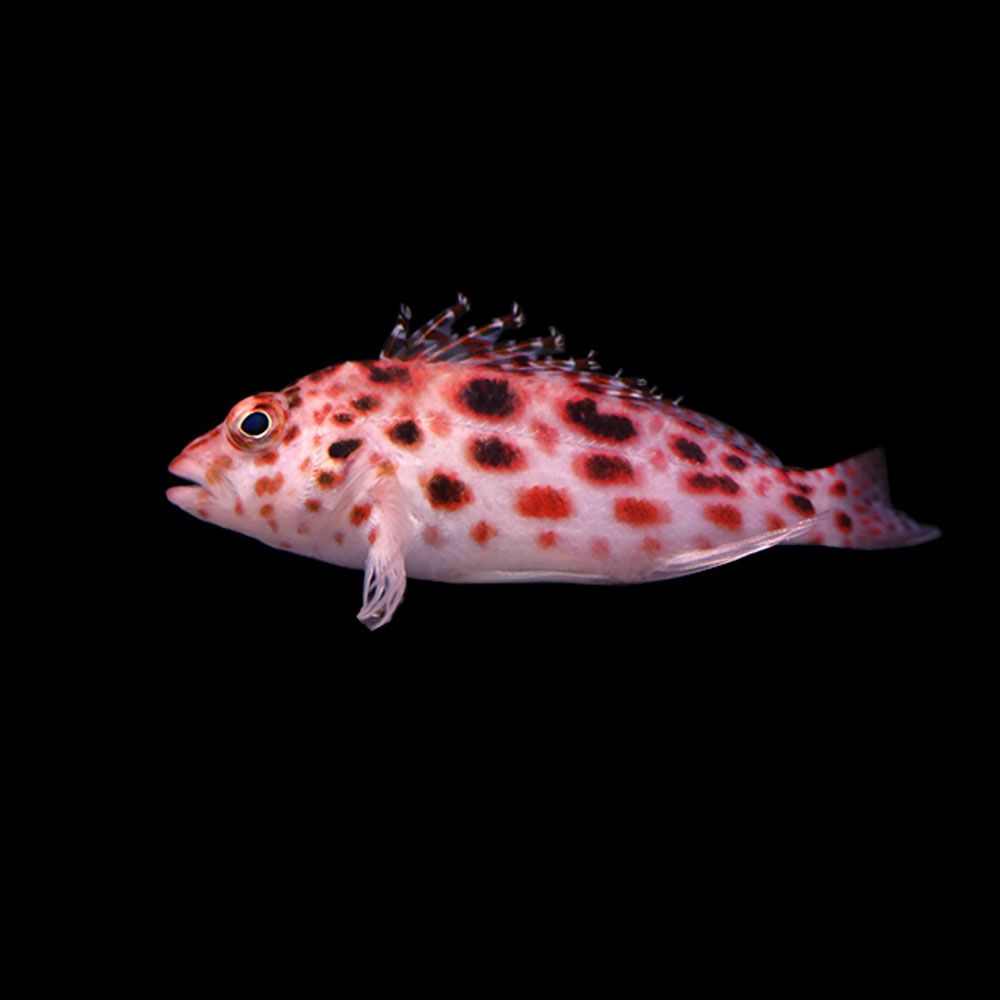ONLINE STORE MINI
Scroll down for a sneak peek at our online store. For full functionality and experience, click the button below to browse the full online store!!
Coral Hawkfish (Cirrhitichthys oxycephalus)
Coral Hawkfish (Cirrhitichthys oxycephalus)
Description:
Overview: The Coral Hawkfish, also known as the Pixy Hawkfish or Spotted Hawkfish, is a small and vibrant species renowned for its unique behavior and striking appearance. These fish are a popular choice for marine aquarists due to their hardy nature, bold personality, and fascinating hunting techniques. Ideal for both novice and experienced aquarists, the Coral Hawkfish adds a dynamic and colorful presence to any saltwater aquarium.
Appearance: The Coral Hawkfish is visually captivating, featuring a body adorned with a mix of red, orange, and white hues, interspersed with numerous small, dark spots. Their body shape is elongated with a slightly flattened head, giving them a distinctive and charming look. The dorsal fin is prominent and often fringed, adding to their dramatic appearance. This vibrant coloration makes them a standout in any marine tank.
Behavior: Coral Hawkfish are known for their perching behavior, often seen resting on rocks and corals, surveying their surroundings for prey. They are active hunters, using their keen eyesight to spot and ambush small invertebrates and fish. Despite their predatory nature, they are generally peaceful towards larger tankmates but can be territorial, especially towards other hawkfish or smaller species.
Diet: Coral Hawkfish are carnivores and thrive on a diet rich in meaty foods. They do well on a mix of high-quality flake food, pellets, and frozen foods such as brine shrimp, mysis shrimp, and finely chopped seafood. Providing a varied diet helps maintain their health and vibrant coloration. Regular feedings are important to keep them healthy and active.
Tank Requirements: Coral Hawkfish thrive in well-structured environments with plenty of live rock, caves, and crevices. A minimum tank size of 30 gallons is recommended to provide ample space for their active nature and territorial behavior. They prefer tanks with multiple perching spots where they can observe their surroundings and hunt.
Tankmates: While generally peaceful towards larger tankmates, Coral Hawkfish can be territorial and may show aggression towards other hawkfish or smaller, more timid species. Suitable tankmates include larger, non-aggressive fish such as tangs, angelfish, and robust wrasses. Avoid housing them with very small fish or invertebrates that may be seen as prey.
Reef Compatibility: Coral Hawkfish are generally reef-safe but may pose a risk to small invertebrates such as shrimp. They do not harm corals and can be a beneficial addition to reef tanks by helping control populations of small pests. Careful monitoring is advised when introducing them to a reef environment.
Max Size: Coral Hawkfish can grow up to 3 inches (7.5 cm) in length. Due to their active nature and need for territory, they require a spacious and well-maintained aquarium to thrive.
Origin: Coral Hawkfish are commonly found in the Indo-Pacific region, particularly around the waters of the Great Barrier Reef, Indonesia, and the Philippines.
Interesting Facts:
- Coral Hawkfish are known for their unique perching behavior and keen hunting skills, making them a fascinating addition to any marine aquarium.
- They are relatively hardy and can adapt well to captivity with proper care and a well-maintained environment.
- Coral Hawkfish are active and inquisitive, often engaging with their surroundings and providing dynamic movement in the tank.
- Their vibrant coloration and bold personality make them a visually captivating and entertaining addition to any saltwater setup.
Disclaimer: Aquarium Arts cannot guarantee compatibility with your current fish or the fish you buy and cannot be held liable for fish lost due to aggression.


